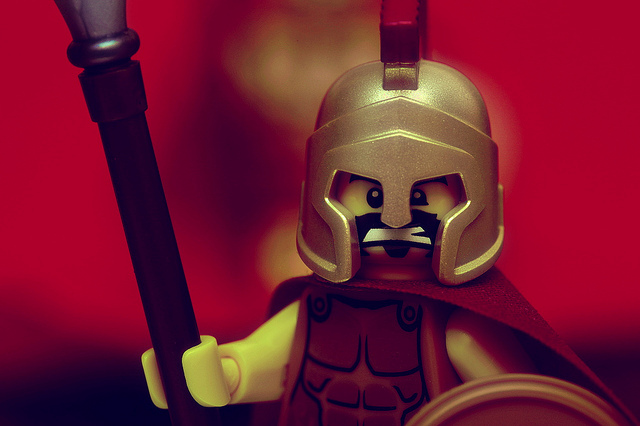The Spartans had a reputation for being among the toughest warriors of the ancient world. They also had a reputation for being terse and blunt when speaking. The Greek writer Plutarch (c. 46-127 AD) collected hundreds of quotations from the Spartans is his work Moralia that reveal just how laconic they could be. Here are our ten favourites:
Some travellers had a chance encounter with a group of Spartans on the road. The travellers said, “You’re lucky. A band of muggers has just hightailed it for the woods.” The Spartans retorted, “We’re not the lucky ones, by God. They are.”
When the poet Pindar wrote “Athens: Greece’s bulwark,” a Spartan noted that with a bulwark like that, Greece would surely fall.
When someone viewed a painting showing Athenians overcoming Spartans and commented, “Courageous Athenians!” a Spartan standing nearby chimed in with “In the picture.”
After the Spartan general Lysander had defeated the Athenians in battle and occupied the city, he sent this message to Sparta, “Athens is taken.” The Spartan leaders, in typical laconic fashion, remarked, “‘Taken’ would have sufficed.”
The Athenians, having surrendered their own city to the Spartans, requested that they might be permitted to enjoy Samos only; upon which the Spartans said, “When you are not at your own disposal, would you be lord of others?” And hence came that proverb, ‘He that is not master of himself begs Samos.’
When King Philip, upon entering Laconia, wrote to the Spartans to inquire whether they preferred him to approach as friend or enemy, they replied, “Neither.”
When King Philip issued orders to the Spartans in a letter, they wrote back, “Regarding your orders to us: No.”
An Argive saying, “We have the tombs of many Spartans amongst us;” a Spartan replied, “But we cannot show the grave one of Argive,” meaning that they had often invaded Argos, but the Argives never Sparta.
A Spartan in a battle had his sword lifted up to kill his enemy, but the retreat being sounded, he did not let the blow fall, and when one asked him why, when his enemy was at his mercy, he did not use the advantage, “Because,” he said, “it is better to obey my leader than kill an enemy.”
One saying to a Spartan that he was worsted in the Olympic games, “Spartan, was the adversary the better man?” “No,” he replied, “but the better tripper.”
You can read more phrases from Ancient World Lists and Numbers, by David Matz (McFarland, 1995)


Sponsored Content


The Spartans had a reputation for being among the toughest warriors of the ancient world. They also had a reputation for being terse and blunt when speaking. The Greek writer Plutarch (c. 46-127 AD) collected hundreds of quotations from the Spartans is his work Moralia that reveal just how laconic they could be. Here are our ten favourites:
Some travellers had a chance encounter with a group of Spartans on the road. The travellers said, “You’re lucky. A band of muggers has just hightailed it for the woods.” The Spartans retorted, “We’re not the lucky ones, by God. They are.”
When the poet Pindar wrote “Athens: Greece’s bulwark,” a Spartan noted that with a bulwark like that, Greece would surely fall.
When someone viewed a painting showing Athenians overcoming Spartans and commented, “Courageous Athenians!” a Spartan standing nearby chimed in with “In the picture.”
After the Spartan general Lysander had defeated the Athenians in battle and occupied the city, he sent this message to Sparta, “Athens is taken.” The Spartan leaders, in typical laconic fashion, remarked, “‘Taken’ would have sufficed.”
The Athenians, having surrendered their own city to the Spartans, requested that they might be permitted to enjoy Samos only; upon which the Spartans said, “When you are not at your own disposal, would you be lord of others?” And hence came that proverb, ‘He that is not master of himself begs Samos.’
When King Philip, upon entering Laconia, wrote to the Spartans to inquire whether they preferred him to approach as friend or enemy, they replied, “Neither.”
When King Philip issued orders to the Spartans in a letter, they wrote back, “Regarding your orders to us: No.”
An Argive saying, “We have the tombs of many Spartans amongst us;” a Spartan replied, “But we cannot show the grave one of Argive,” meaning that they had often invaded Argos, but the Argives never Sparta.
A Spartan in a battle had his sword lifted up to kill his enemy, but the retreat being sounded, he did not let the blow fall, and when one asked him why, when his enemy was at his mercy, he did not use the advantage, “Because,” he said, “it is better to obey my leader than kill an enemy.”
One saying to a Spartan that he was worsted in the Olympic games, “Spartan, was the adversary the better man?” “No,” he replied, “but the better tripper.”
You can read more phrases from Ancient World Lists and Numbers, by David Matz (McFarland, 1995)
Sponsored Content